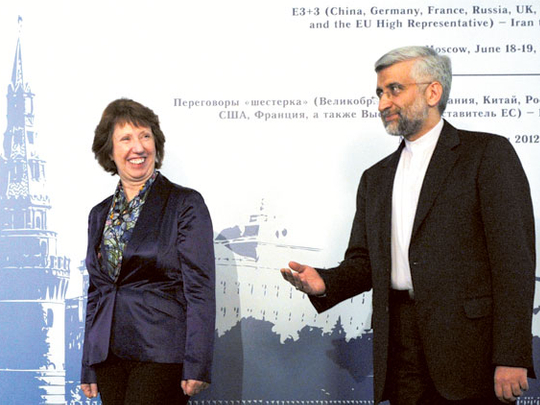
Moscow World powers began two days of talks with Iran on Monday to try to end a decade-long stand-off over Tehran’s nuclear programme and avert the threat of a new war in the Middle East.
In Iran, President Mahmoud Ahmadinejad said Tehran would be prepared to stop enriching uranium to a higher level - a process that could be used to make nuclear arms - if the six powers agreed to meet its needs for the fuel. But it is not clear how much influence Ahmadinejad has over the negotiations and whether his remarks reflect Tehran’s position in the talks.
Experts and diplomats said a breakthrough was unlikely at the meeting in Moscow, where the world powers are wary of making concessions that would enable Tehran draw out the talks and give it more time to develop a nuclear weapons capability.
“The atmosphere was fine, business-like and good. We hope this translates into a serious political commitment by the Iranians to address our proposals,” a European Union spokesman said after the talks started in the Russian capital.
But a Western official made clear the United States, Russia, China, Britain, France and Germany were ready to deepen Iran’s diplomatic and economic isolation if no deal is reached.
“If Iran remains unwilling to take the opportunities these talks present, it will face continuing and intensified pressure and isolation,” a Western official said.
The Moscow talks follow two rounds of negotiations since diplomacy resumed in April following a 15-month hiatus.
The United States wants to halt Iran’s enrichment of uranium to 20 per cent purity, a level which some experts consider to be a dangerous step towards achieving the ability to create the explosive material required to make a nuclear bomb.
Ahmadinejad’s comments on enrichment appeared intended to ease pressure from the world powers and encourage them to make concessions at the talks.
“From the beginning the Islamic Republic has stated that if European countries provided 20 per cent enriched fuel for Iran, it would not enrich to this level,” Ahmadinejad stated in comments published on his presidential website.
New US and European Union sanctions are due to come into force in two weeks, tightening economic pressure on Iran.
Without progress to ensure Iran does not develop nuclear arms, Israel “could find itself facing the dilemma of ‘a bomb, or to bomb’,” Vice Prime Minister Moshe Yaalon said on Sunday.
“Should that be the choice, then bombing (Iran) is preferable to a bomb (in Iran’s hands),” he said. “I hope we do not face that dilemma.”
The six powers - led by EU foreign policy chief Catherine Ashton - hope at least to win assurances that Tehran is willing to discuss concrete solutions, opening the way to progress.
The six nations want a substantive response to their offer of fuel supplies for a research reactor and relief in sanctions on the sale of commercial aircraft parts to Iran.
At the last talks, in Baghdad last month, they asked Tehran in return to stop producing higher-grade uranium, ship any stockpile out of the country and close down the underground Fordow facility where such work is done.
But Iran’s chief negotiator, Saeed Jalili, has indicated the incentives on offer are insufficient.
Iranian officials said Tehran would express dissatisfaction there were no preparatory talks for the Moscow meeting and that progress was possible only if the six powers acknowledged its right to enrich uranium, something they have refused to do until Tehran agrees to in-depth U.N. inspections of its nuclear sites.










